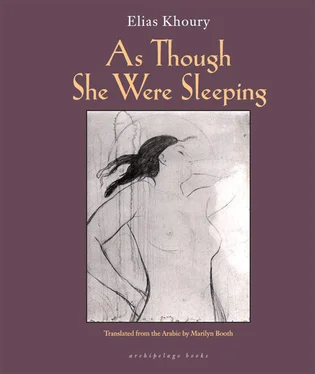Jaffa is not Beirut. Nor was Manshiyya the Bourj Square she knew so well. The rough humidity here was not like that of Beirut with its scent of gently rotting trees. She went to Jaffa to attend the brother’s funeral and there she saw the country called Palestine. In Beirut she had not sensed herself as part of a country despite living through the headiness of independence from the French Mandate. She had remained mostly oblivious. She had not heard about Faisal I and the story of the kingdom he had founded in Damascus, which was to extend all the way to Beirut, until her husband told her about it in the Hotel Massabki, when he called her to stand beneath the image of a man with distracted eyes who was said to be king of the Syrian lands.
In Nazareth she lived outside of time. The city was boiling over but she did not really notice anything out of the ordinary. The only person in town with whom she had spent any time was Mansour’s aunt Malvina Surouji, whose only topic of conversation was the man who had married her daughter, Nadiya. People had comforted her with the words that he would be a reasonable substitute for Mansour, she said. Ahh, my poor girl, you were meant to marry your cousin Mansour, but what can we do with Fate? The bride from Beirut had to show her sympathetic solidarity with this woman who still dreamed of Mansour as the rightful husband for her daughter.
Then there appeared that aged man who claimed descent from that eminent Lebanese warrior of another age, the Emir Fakhr el-Din el-Ma’ani II. At first the man frightened her, but she grew accustomed to him soon enough. She asked Aunt Malvina about him. He was called Mad Tanyous and he had left Nazareth long ago. But he was not really mad. Milia did not know how one might accurately describe this odd man who wore the black vestments of a priest but with a felt skullcap in the way of the peasants of Jabal Lubnan, wrapping his middle with a white and black striped Palestinian Kaffiyeh. I am all alone, he said to Milia in his Palestinian accent, skewing some of the letters and sounds in an attempt to give it a Lebanese twist. Appearing before her window by night only to vanish, he would reappear in the mornings to shadow her through the streets of the city.
The woman lived her Nazareth story in walking its narrow streets and uncovering this place to which she had come. This town was in essence the solemn and dreadful anticipation that it inspired. That is what she came to understand about the Messiah’s town as she lived there. In these wanderings around town she would see him now and then, and she gave him a few pennies because she believed him to be a beggar. He took them without thanking her as though she were simply doing her duty. She began to bring him loaves of bread and other food. To be more accurate, several times she invited him to the house so that he could eat but she did not dare bring him inside. She brought the food to him in the garden and observed him as he ate, though he did not give the appearance of eating. He did not look at the food but simply swallowed it rapidly and perfunctorily as if he found it beneath him, wiped his moustache and beard with his chapped palm, and melted away. She did not tell Mansour that she had invited him. She said he had shown up. She told a story that had not come to pass but she was certain that in some way or other it must have come to pass.
And where was I? asked Mansour.
You were asleep, here in the house, Milia said. I tried to wake you up but I couldn’t. I found him standing in front of the window. He said he was hungry. That is how he began coming here.
Milia was not speaking the exact truth. She heard a knock on the window. It was nighttime and Mansour was out. Everything had changed since Mansour had started going regularly to Jaffa and had decided to take up the hardware manufacturing business that his brother’s murder had left untended. Mansour was not there and Milia slept alone in the house. She was not afraid but she was uneasily aware of the dreadful solemnity of the night, of her solitude, and of the baby in her belly. She heard a knocking at the window. She got up and saw the dark outline of a man just disappearing behind the trees. She went back to bed, covered herself up, and waited. The next night the same scene occurred but the third night was different. It was about ten o’clock. Everything was silent in the Greek Orthodox quarter where Mansour had bought the newlyweds a home. This time she heard a violent knocking on the window. Going over to the window she saw the ghostly form of a man.
Who is it? she asked, her voice quavering with fright.
Me, answered the shape standing behind the window. Open it, I have brought you a gift.
She did not know where the strength to open the window came from — as though she were not herself, as though she were sleeping. As though someone gave orders and she obeyed. She opened the window and noticed a goblet of wine in the man’s hand. He gave it to her and said he would come back.
It is the water of life, he said, and disappeared.
She did not see him leave; she did not see the back of him. He had been facing her when a darkness fell suddenly and covered him. The little girl found herself standing alone with her swelling belly in front of the window holding a glass of red liquid near to overflowing. She brought it to her nose and smelled aged wine. She touched the glass to her lips but did not drink. She returned to the window to close it and saw that it was already closed. She shouted for Mansour but no one answered. She saw Musa coming toward her. She wanted to ask him what had brought him here. Musa took the glass from her hand and drained it. He held the empty glass out for his sister as a darkness fell over him and erased his form. The girl saw herself holding an empty glass and standing alone. She stepped back and was suddenly submerged in darkness pierced by a single bold light. She picked up the light in her hands. The goblet shone. Suddenly and without her realizing what was happening, the goblet slipped and shards of glass scattered everywhere. She bent over the glass slivers intermingled with points of light, wanting to pick them up, but every time she touched a shred of light it went out and blood dripped from her finger, as though she were replacing scraps of light with blood. But she had to pick up the fragments somehow. She waited for Mansour but he did not come. She was afraid he might step on the shreds of glass and hurt himself. She picked up the glass chips and saw their shine suddenly extinguished between her wounded fingers and saw how they were coated in dark, dark blood. She carried the bits of glass with her wounded fingers and slipped to the ground and saw the blood. She opened her eyes to find herself in her bed, her heart pounding so hard that she could feel it throughout her body. She made the sign of the cross and decided that she would forget this particular dream, and closed her eyes once again.
In the morning when Mansour stopped in, having just returned from Jaffa, and woke her up, his face as pallid as ever since the assassination of his brother, Amin, she jumped out of bed barefoot to make his coffee and breakfast. She remembered the glass and felt something pricking the sole of her foot. She searched for her slippers beneath the bed and found them covered in white-blond feathers. She had no idea where the feathers had come from, but she brushed them off and put the slippers on her feet. She went to the kitchen and put the coffeepot on the flame. She reached toward the small wood cabinet to get coffee cups out and saw it there. Among the coffee cups, the goblet shone with light. Where had the wine goblet come from? In her house there were no wineglasses. Mansour drank arak exclusively and if she drank, it was to drink arak along with him.
She asked him where the wine goblet had come from. He was in the bathroom and did not hear her question. She picked up the goblet with two shaking hands and set it down on the table. She saw the gleaming flashes of light and scattered fragments of glass. When the coffee boiled over on the stove she did not notice. She saw Mansour hurry over to turn off the flame. Setting the coffeepot down on the table, he asked her why she was standing so still.
Читать дальше












